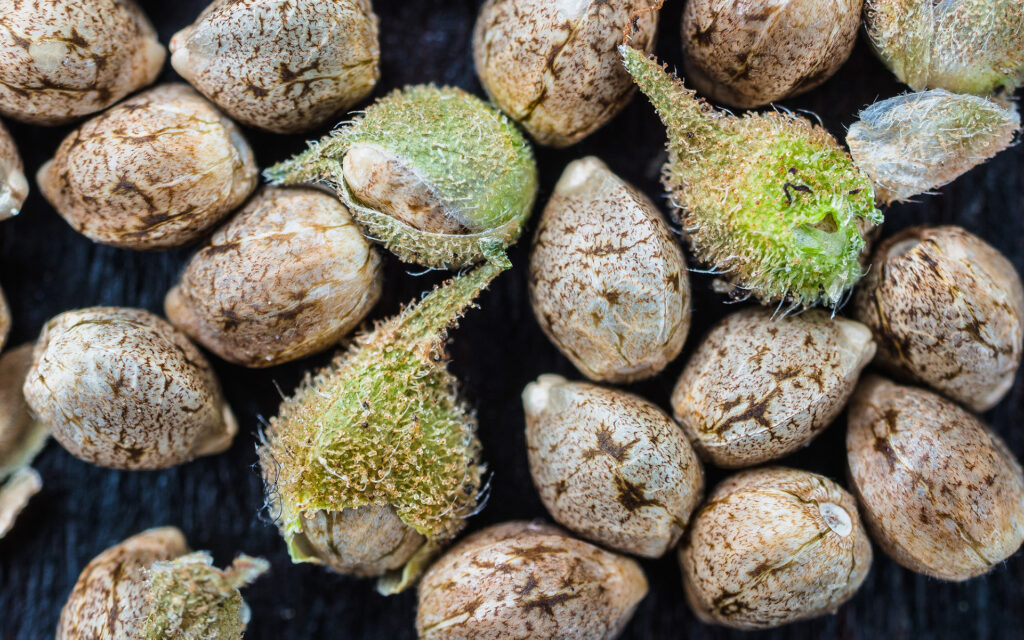Introduction
The Cannabis Act of 2018 legalized the recreational use of cannabis in Canada. This shift in legislation has sparked a growing interest in cannabis cultivation, with many individuals curious about growing their plants. For those interested in cultivating cannabis, understanding cannabis seeds is a crucial first step.
This guide dives into the world of cannabis seeds in Canada, exploring their legality, proper storage techniques, and germination considerations. It’s important to remember that this information is for educational purposes only. The laws and regulations surrounding cannabis cultivation vary by province and territory, so it’s vital to research the specific guidelines in your region.
What are Cannabis Seeds and Why Are They Important?
Cannabis seeds are tiny, hard-shelled kernels that hold the potential for a future cannabis plant. They contain the embryo, the blueprint for the future plant, and the endosperm, a food source that nourishes the developing seedling.
For those interested in cultivating their cannabis, acquiring high-quality cannabis seeds is essential. Selecting healthy, viable seeds increases the chances of successful germination and a thriving cannabis plant.
Cannabis Seed Legality in Canada: Understanding the Landscape
The legality of cannabis seeds in Canada hinges on several factors, primarily the purpose of cultivation and provincial/territorial regulations. Here’s a breakdown of the key points:
- Federal Law: The Cannabis Act allows adults (19 years and older) to possess up to four cannabis plants per residence for personal use. However, the Act specifies that these plants must be grown from “licensed seed or seedlings.”
- Provincial/Territorial Regulations: Provinces and territories have the authority to implement additional regulations regarding cannabis cultivation. While the federal law permits cultivation from licensed seeds, some provinces (like Quebec) have opted out of this aspect of the legislation, making personal cultivation illegal within their borders.
Where to Acquire Cannabis Seeds in Canada
If you reside in a province or territory where personal cannabis cultivation is legal, licensed cannabis retailers are authorized to sell cannabis seeds. These retailers are strictly regulated by the government and ensure the seeds are of high quality and originate from licensed producers.
Read This- The Ultimate Guide to Choosing and Growing Weed Seeds
Storing Your Cannabis Seeds for Optimal Viability
Proper storage is paramount for maintaining the viability (germination potential) of your cannabis seeds. Here are some key storage practices to follow:
- Cool, Dark, and Dry Environment: Heat, light, and moisture can all degrade the quality of cannabis seeds. Store your seeds in a cool, dark, and dry location. Basements or similar areas with consistent temperatures are ideal.
- Airtight Containers: Use airtight containers, such as glass jars or seed vials, to prevent moisture fluctuations and contamination.
- Desiccant Packs: Consider adding desiccant packs or silica gel packets to the containers. These absorb excess moisture and maintain a dry environment.
- Labeling: Clearly label your containers with the strain name, harvest date, and any other relevant information. This aids in record-keeping and helps you track the age and viability of your seeds.
- Refrigeration or Freezing (Optional): For extended storage periods (over six months), refrigeration or freezing can be beneficial. However, ensure proper storage procedures to avoid damaging the seeds. Thoroughly dry the seeds before storing them in the refrigerator or freezer, and use airtight, moisture-proof containers. Avoid temperature fluctuations, as this can harm the seeds.
Germination Considerations: Important Notes
The following information describes general seed germination practices and does not constitute instructions for cultivating cannabis in Canada.
Germination is the process by which a seed sprouts and begins to grow. Understanding the germination process can be helpful for those curious about cannabis seed viability. Here are some general factors to consider:
- Seed Quality: High-quality, fresh seeds have a higher germination rate.
- Moisture: Seeds require moisture to germinate, but overwatering can be detrimental. Aim for a consistently moist environment, not soggy.
- Warmth: Most seeds germinate best in warm temperatures, typically between 70-80 degrees Fahrenheit (21-27 degrees Celsius).
- Darkness (for some seeds): While some seeds require light to germinate, many benefit from darkness during the initial stages.
- Patience: Germination times can vary depending on the seed variety and other factors. Patience is key!
Additional Considerations
- Seed Selection: For those residing in regions where cultivation is legal, licensed retailers offer a wide variety of cannabis seed options. These may include feminized seeds (guaranteed to produce female plants), autoflowering seeds (automatically transition to the flowering stage without light cycle changes), and various cannabis strains with unique characteristics. Researching different strains can help you find seeds suited to your preferences and growing conditions.
- Germination Resources: A wealth of information exists online regarding seed germination techniques. It’s important to seek resources from reputable sources and remember that these resources are for educational purposes only and may not be applicable to cannabis seed germination in Canada.
- Responsible Cultivation: For those residing in legal regions and considering cultivation, responsible practices are paramount. Understanding proper growing techniques, ventilation requirements, and potential risks like mold growth is crucial. Again, emphasize that this information is for educational purposes only.
Conclusion
The world of cannabis seeds is fascinating, offering a glimpse into the potential for future cannabis plants. In Canada, the legal landscape surrounding cannabis seeds is constantly evolving. By staying informed about the legalities, proper storage techniques, and general germination concepts, you can empower yourself to make informed decisions should the legalities of cultivation change in your region. Always prioritize research and compliance with all applicable laws and regulations.
Happy Growing!

